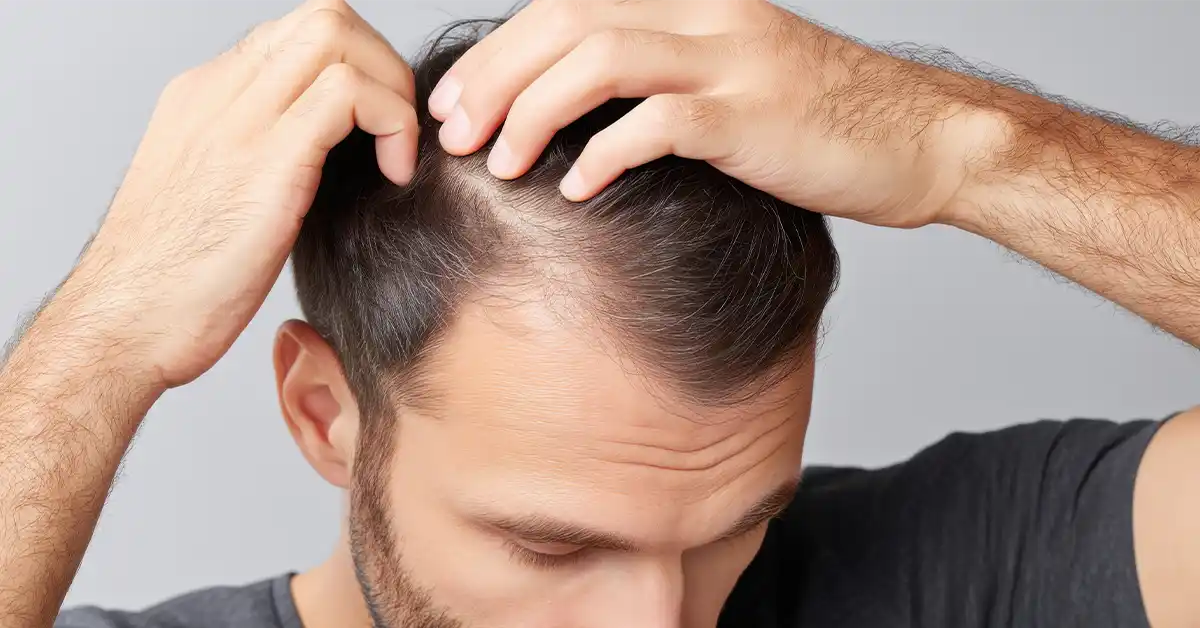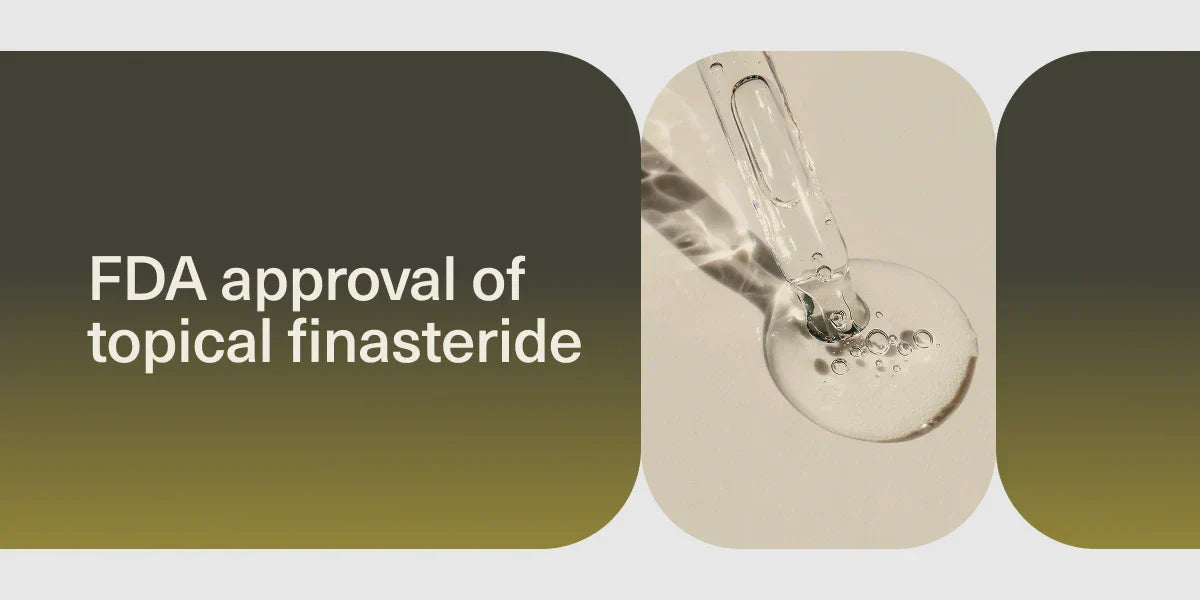Globally the number of people taking antidepressants is rising, but like most medications, there are possible side effects. One that's gained attention recently is hair loss. Let’s take a closer look at how and why antidepressants can cause hair loss, whether this hair loss is permanent and what you may be able to do about it. Mental health and hair loss are complex issues that can influence each other, and we recommend talking to a trusted healthcare professional about the medications you’re taking and their potential side effects if you’re worried.
Do antidepressants cause hair loss?
It’s not a common side effect, but hair loss has been reported by people taking antidepressants. This type of drug-induced hair loss is actually a form of telogen effluvium and usually begins within the first three months of starting an antidepressant. In fact, this can occur when starting any new medication.
Telogen effluvium is the clinical term for the temporary increase in shedding that occurs shortly after experiencing stress or being exposed to a trigger. Many things can cause telogen effluvium including illness, psychological or emotional stress and taking certain medications. In the case of the latter, the cause of the sudden increase in shedding is the drug’s impact on the hair growth cycle. Hairs in the active growth (anagen) phase of the hair growth cycle transition into the rest (telogen) phase prematurely.
The hair growth cycle is a coordinated process that responds to changes such as an increase in the concentrations of medications you may be taking and their effects on the body (e.g., hormone levels). As your body becomes used to a medication (a process that could take several weeks) this type of shedding usually resolves without the need for additional treatment. In other cases, patients may need to stop taking a medication for hair loss to stop—this isn’t always an option so it’s important to discuss how to best manage your hair loss with a doctor or other trusted healthcare professional.
Which antidepressants cause hair loss?
Drug-induced telogen effluvium isn’t medication-specific and studies have shown that several antidepressants can cause hair loss. Some of the most commonly prescribed antidepressants are selective serotonin re-uptake inhibitors, or SSRIs. This category includes drugs like fluoxetine (Prozac), escitalopram (Lexapro) and sertraline (Zoloft). Another well-known atypical antidepressant that has been associated with hair loss is bupropion (Wellbutrin).
Although all of the medications listed above can cause hair loss, the risk may be higher for some. For example, one large population-based cohort study reported that bupropion was more likely to cause hair loss compared to SSRIs and selective norepinephrine reuptake inhibitors (SRNIs). Additionally, amongst SSRIs, paroxetine was associated with the lowest risk of hair loss (Etminan et al., 2018). All the participants included in the analysis were new users of antidepressants and did not take more than one antidepressant at the same time.
How do antidepressants cause hair loss? The mechanisms aren’t entirely clear but in the case of SSRIs, it’s been speculated that changes in serotonin concentrations could influence melatonin production, a hormone involved in controlling the hair growth cycle (Slominski et al., 2005). Hair loss may also be a sign of a general sensitivity to a specific antidepressant.
Is hair loss from antidepressants permanent?
Hair loss due to taking antidepressants usually isn’t permanent. The increased shedding that some people experience when they start a new medication is a stress response and once the body adjusts to the medication, hair loss usually tapers off. There are things you can do to help promote hair growth, but intervention may not be necessary. We’ll talk about some of these strategies in the sections below.
The reversibility of hair loss can depend on the stage of growth and parts of the hair follicle and hair shaft that are affected. Telogen hairs aren’t actively growing and are waiting to be shed to make room for new hairs. Antidepressant use can shorten the hair growth cycle, making telogen occur earlier, but it doesn’t affect the growth of cells themselves. One systematic review of hair loss associated with the use of SSRIs found more than half of patients (63%) who reported alopecia experienced improvements in hair growth after stopping their medication. The time to recovery ranged from 5 days to up to 6 months (Pejcic and Paudel, 2022).
There is another type of hair loss called anagen effluvium that affects hairs in the anagen phase of the hair growth cycle. A common trigger for anagen effluvium is chemotherapy treatment. In contrast to antidepressants, these medications are toxic to the fast-growing cells that make up the hair shaft. Research shows that many patients who experience anagen effluvium are able to regrow their hair once they stop taking their treatment, but there have been cases of permanent hair loss. Whether or not hair loss is permanent could depend on factors like the type of medication, as well as the dosage and extent of damage to the hair follicle (Saleh et al., 2024). Antidepressants aren’t typically associated with anagen effluvium, though one study has stated that certain drugs in this family could trigger it (Kraskowa et al., 2007).
What can I do to stop hair loss from antidepressants?
If you’ve noticed increased shedding after taking an antidepressant, there are things you can do to manage it. Hair loss isn’t just a physical side effect; it’s something that could worsen existing psychological symptoms. That’s why we recommend talking to a doctor or other trusted healthcare professional if you're worried about it.
-
Stopping, changing or lowering your treatment
Although it’s the most effective way to stop hair loss, stopping treatment won’t be an option for most patients. You’ll need to work with your doctor to assess the benefits and risks of staying on treatment. Fortunately, some studies have shown that choosing a different agent within the same class of antidepressants or choosing an antidepressant from another class could be beneficial. Another potential option that could help with hair loss is lowering the dose of your current treatment. We should mention that none of these changes should happen without first consulting your prescribing physician. If a change to treatment is recommended, it may take 3-6 months before you’re able to accurately assess whether there’s been any improvement.
-
Consider oral or topical hair treatments
Depending on your needs, you may want to consider trying a medicated treatment to help promote hair growth. Topical minoxidil can be purchased without a prescription at certain strengths (2% and 5%), while low dose oral minoxidil requires a doctor’s consultation and prescription. Neither format of minoxidil is known to exacerbate psychological symptoms, which is important if you’re actively managing your mental health. The use of minoxidil to treat telogen effluvium is considered off-label (i.e., for a condition that isn’t formally outlined in the drug monograph).
Minoxidil encourages thicker, stronger hair via several mechanisms though it’s probably best known for increasing blood flow to the scalp and therefore, oxygen and nutrient exchange needed for optimized growth. Keep in mind that starting a new hair loss treatment can also trigger a period of temporary shedding, with minoxidil, it’s usually an indication that the hair growth cycle is being reset and isn’t something to be worried about. A yearlong observational study in men found that application of topical minoxidil helped shrink affected areas of hair loss in 62% of patients and reduced the number of hairs lost during hair washing by about 50% (Rundegren, 2004).
XYON offers compounded and uncompounded versions of low dose minoxidil. We also offer compounded topical treatments that include minoxidil and a different medication called finasteride. The latter isn’t usually an option for patients with antidepressant related hair loss because finasteride is typically only used to treat a form of hair loss called androgenetic alopecia, or pattern hair loss.
-
Ensuring adequate nutrition, exercise and stress management
If treatment isn’t something you’re interested in, or a candidate for, you can still take steps to build a solid foundation for hair growth. One way is to be aware of nutritional needs—something that some individuals living with depression may struggle with. True deficiencies are rare in the general population, but some people may still benefit from supplementation with specific vitamins and minerals. It also goes without saying that staying active is beneficial to the maintenance of overall health (and can also help to alleviate depressive symptoms) but the vascular and stress-reducing effects of exercise are especially relevant to promoting hair growth.
Finally, we’re big advocates for self-care and believe that effective stress management can also make a difference. Cortisol levels tend to increase during periods of stress but there’s reason to believe that implementing strategies to help lower cortisol may help regulate the hair growth cycle (Thom, 2016). Additionally, existing research has shown that there may be a relationship between abnormal cortisol production and/or regulation and the incidence of depression and other psychiatric disorders (Dziurkowska and Wesolowski, 2021). We recognize that stress management strategies alone may not be enough to help alleviate symptoms of depression or significantly improve the appearance of thinning hair, but they can play a role in supporting your overall health in the long term.


Treat Your Hair Loss Safely With Minoxidil
For anyone managing their mental health, minoxidil is considered the safe option for addressing hair loss. XYON offers prescription oral minoxidil.
When to see a doctor about hair loss due to antidepressants
We asked Dr. Christina Han (MD, FRCPC), a board-certified dermatologist and Medical Director at XYON about how she approaches treating her patients who come to see her about hair loss relating to the use of medications like antidepressants:
“Typically, I try and reassure patients that this type of hair loss is often temporary and dissipates over time. I encourage them to speak with their prescribing doctors to see if there are options they can switch to, or if decreasing the dose is a viable option. If the hair loss proves to be too stressful for the patient, discontinuing medication might be necessary, as this usually results in reversal of shedding. However, this is a decision that should only be made after consulting with the prescribing doctor. For patients who are interested in more targeted treatment for hair loss, I would recommend minoxidil to help combat the effects of thinning while still allowing them to remain on their antidepressant treatment.
When it comes to when to reach out to a doctor about hair loss, this type of shedding tends to happen very abruptly and shedding is the most noticeable when doing things like brushing or running your hands through your hair, washing your hair or even just noticing more hair around the house than normal. We shed approximately 100 hairs every day and many people have a pretty good sense of what this looks like. If the amount of hair you’re losing suddenly increases, then it’s probably a good idea to speak to a doctor.
Hair loss can be a deeply emotional and stressful thing to experience so I take the time to counsel my patients and avoid creating a sense of panic. After all, stress can exacerbate hair loss. If patients are worried about shedding, they should know that there’s absolutely no shame in seeking help and trying to get a better understanding of what might be causing their hair loss. Hair loss is a complex issue, and it can take time to figure out what factors might be at play.”
Antidepressants and hair loss: takeaway
Antidepressants are one of the most commonly prescribed medications and their increased use has drawn attention to hair loss as a possible side effect. It’s not common, but hair loss after taking antidepressants is a form of telogen effluvium, or stress-related hair loss. Hair follicles are sensitive to changes in the body, which can include taking new medications or fluctuating hormone levels. These can cause hairs in the active phase of the hair growth cycle to transition early into the rest phase. This results in a temporary period of increased shedding that often resolves once the body gets used to a medication. Drug-induced telogen effluvium usually starts within the first few weeks of beginning a medication and can take up to 3-6 months to grow back.
Hair loss associated with taking antidepressants doesn’t typically require specialized treatment, but there are things you can do to help with shedding, including considering treatment with a hair growth agent such as minoxidil, maintaining a healthy diet and staying active, and practicing methods for stress management. Remember, you should never stop or change your medications without first consulting with your prescribing doctor. In some cases, hair loss can be managed by switching to a different antidepressant or lowering the dose. Dealing with unexpected hair loss on top of your mental health can be overwhelming, but you don’t need to deal with it on your own.
References:
Dziurkowska, E., & Wesolowski, M. (2021). Cortisol as a Biomarker of Mental Disorder Severity. Journal of Clinical Medicine, 10(21), 5204. https://doi.org/10.3390/jcm10215204
Etminan, M., Sodhi, M., Procyshyn, R. M., Guo, M., & Carleton, B. C. (2018). Risk of hair loss with different antidepressants: a comparative retrospective cohort study. International Clinical Psychopharmacology, 33(1), 44–48. https://doi.org/10.1097/YIC.0000000000000191
Krasowska, D., Szymanek, M., Schwartz, R. A., & Myśliński, W. (2007). Cutaneous effects of the most commonly used antidepressant medication, the selective serotonin reuptake inhibitors. Journal of the American Academy of Dermatology, 56(5), 848–853. https://doi.org/10.1016/j.jaad.2006.10.020
Pejcic, A. V., & Paudel, V. (2022). Alopecia associated with the use of selective serotonin reuptake inhibitors: Systematic review. Psychiatry Research, 313, 114620. https://doi.org/10.1016/j.psychres.2022.114620
Rundegren, J. (2004). Rapid onset of action of minoxidil 5% topical solution in a 4-month German observational study on both patients and physicians. Journal of the American Academy of Dermatology, 50(3), P91. https://doi.org/10.1016/j.jaad.2003.10.290
Saleh, D., Nassereddin, A., & Cook, C. (2021). Anagen Effluvium. PubMed; StatPearls Publishing. https://www.ncbi.nlm.nih.gov/books/NBK482293/
Slominski, A. T., Kim, T.-K., Janjetovic, Z., Slominski, R. M., Ganguli-Indra, G., Athar, M., Indra, A. K., Reiter, R. J., & Kleszczyński, K. (2025). Melatonin and the Skin: Current Progress and Perspectives for Human Health. Journal of Investigative Dermatology, 145(6), 1345-1360.e2. https://doi.org/10.1016/j.jid.2024.11.012
Thom E. (2016). Stress and the Hair Growth Cycle: Cortisol-Induced Hair Growth Disruption. Journal of Drugs in Dermatology : JDD, 15(8), 1001–1004.




